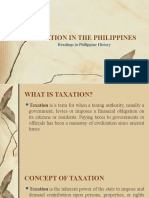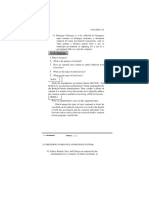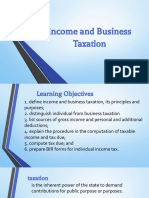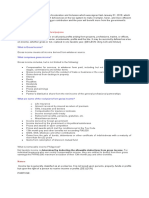Taxation
Taxation
Uploaded by
johnbalili2003Copyright:
Available Formats
Taxation
Taxation
Uploaded by
johnbalili2003Copyright
Available Formats
Share this document
Did you find this document useful?
Is this content inappropriate?
Copyright:
Available Formats
Taxation
Taxation
Uploaded by
johnbalili2003Copyright:
Available Formats
TAXATION
Learning Outcomes
At the end of this lesson, you should be able to:
• Explain the nature and purpose of taxation
• Identify the types of national and local taxes
• Argue for or against a current taxation issue
Taxation means laying a tax through which the government generates income to defray its expenses. It is a way to raise funds
for government programs and services that benefit Filipino citizens. Economic investments and businesses in the Philippines have
created several definitions of taxation enforced by national or local laws for income collection and development of the government.
A tax is enforced as a contribution but it is proportionate to the citizen's ability to pay. It is levied on persons (who actually pay
with money) and property as well as on business transactions, privileges, and benefits. The imposition of taxes is done by law through
the Bureau of Internal Revenue.
Types of Taxes
There are two types of taxes: national and local. National taxes are the ones paid to the government through the Bureau of Internal
Revenue. The national taxation system is based on the National Internal Revenue Code of 1997 or the Republic Act No. 8424
otherwise known as the Tax Reform Act of 1997, as amended.
The types of national taxes are as follows:
1. Capital Gains Tax is a tax imposed on gains that may have been realized by a seller from the sale, exchange, or other
disposition of capital assets located in the Philippines, including pacto de retro sales (a sale with a condition for repurchase)
and other forms of conditional sale.
2. Documentary Stamp Tax is a tax on documents, instruments, loan agreements, and papers evidencing the acceptance,
assignment, sale, or transfer of an obligation, rights, or property incident thereto.
Documentary stamp taxes are evident on documents like bank promissory notes, deed of sale, and deed of assignment on
transfer of shares of corporate stock ownership.
3. Donor's Tax is a tax on a donation or gift. It is also a tax imposed on the gratuitous transfer of property between two or more
persons who are living at the time of the transfer. It shall apply whether the transfer is in trust or otherwise, whether the gift is
direct or indirect, and whether the property is real or personal, tangible or intangible. A donor's tax is based on a graduated
schedule of tax rate.
4. Estate Tax is a tax on the right of the deceased person to transmit his/her estate to lawful heirs and beneficiaries at the time
of death and on certain transfers which are made by law as equivalent to testamentary disposition. It is not a tax on property. It
is a tax imposed on the privilege of transmitting property upon the death of the owner. The estate tax is based on the laws in
force at the time of death notwithstanding the postponement of the actual possession or enjoyment of the estate by the
beneficiary.
Estate tax is also based on a graduated schedule of tax rate.
5. Income Tax is a tax on all annual profits made from property ownership, profession, trades or offices. It is also a tax on a
person's income, emoluments, profits and the like. Self-employed individuals and corporate taxpayers pay quarterly income
taxes from the first quarter to the third quarter. And instead of filing quarterly income tax on the fourth quarter, they file and pay
their annual income tax return for the taxable year. Individual income tax is based on graduated schedule of tax rate, while
corporate income tax in based on a fixed rate prescribed by the tax law or special law.
6. Percentage Tax is a business tax imposed on persons or entities who sell or lease goods, properties, or services in the
course of trade or business whose gross annual sales or receipts do not exceed the amount required to register as VAT-
registered taxpayers. Percentage taxes are usually based on a fixed rate. They are usually paid monthly by businesses or
professionals. However, some special industries and transactions pay percentage tax on a quarterly basis.
7. Value-Added Tax is a business tax imposed and collected from the seller in the course of trade or business on every sale of
properties (real or personal), lease of goods or properties (real or personal), or vendors of services. It is an indirect tax, thus, it
can be passed on to the buyer, causing the increase of prices of most goods and services bought and paid by consumers,
VAT returns are usually filed and paid monthly and quarterly.
The latest law on Taxation is RA 9337 signed on May 24, 2005 by President Gloria Arroyo is known as the "expanded value-
added tax" or the "E-VAT" law.
8. Excise Tax is a tax imposed on goods manufactured or produced in the Philippines for domestic sale or consumption or any
other disposition. It is also imposed on things that are imported.
9. Withholding Tax on Compensation is the tax withheld from individuals receiving purely compensation income arising from
an employer-employee relationship. This tax is what employers withheld in their employees' compensation income and remit
to the government through the BIR or authorized accrediting agent.
10. Expanded Withholding Tax is prescribed only for certain payors like those withheld on rental income and professional
income. It is creditable against the income tax due of the payee for the taxable quarter year.
11. Final Withholding Tax is a kind of withholding tax which is prescribed only for certain payors and is not creditable against the
income tax due of the payee for the taxable year. An example of final withholding tax is the tax withheld by banks on the
interest income earned on bank deposits.
12. Withholding Tax on Government Money Payments is the withholding tax withheld by government offices including
government-owned or controlled corporations and local government units, before making any payments to private individuals,
corporations, partnerships and/or associations.
Local taxes, on the other hand, is based on the local government taxation in the Philippines as stated in Republic Act 7160 or the
Local Government Code of 1991, as amended. These taxes, fees, or charges are imposed by the local government units, such as
provinces, cities, municipalities, and barangays.
Local taxes, on the other hand, include:
1. Tax on Transfer of Real Property Ownership is imposed on the sale, donation, barter, or on any other mode of transferring
ownership of real property.
2. Tax on Business of Printing and Publication is imposed on printing and publication businesses like that of books, cards,
posters, leaflets, handbills, certificates, receipts, pamphlets, and others of similar nature.
3. Franchise Tax is a tax on franchised businesses, at the rate not exceeding fifty percent (50%) of one percent (1%) of the
gross annual receipts of the preceding calendar year based on the incoming receipt (the annual earning) within the territorial
jurisdiction where the franchise is selling in.
4. Tax on Sand, Gravel, and Other Quarry Resources is imposed on ordinary stones, sand, gravel, earth, and other quarry
resources, as defined under the National Internal Revenue Code, as amended. This refers to the above materials that are
extracted from public lands or from the beds of seas, lakes, rivers, streams, creeks, and other public waters within its territorial
jurisdiction.
5. Professional Tax is an annual tax on each person engaged in the exercise or practice of his or her profession that requires
government examination, like licensure examinations.
6. Amusement Tax is a tax collected from the proprietors, lessees, or operators of theaters, cinemas, concert halls, circuses,
boxing stadia, and other places of amusement.
7. Annual Fixed Tax for Every Delivery Truck or Van of Manufacturers or Producers, Wholesalers of, Dealers, or
Retailers in, Certain Products is an annual fixed tax for every truck, van or any vehicle used by manufacturers, producers,
wholesalers, dealers, or retailers in the delivery or distribution of distilled spirits, fermented liquors, soft drinks, cigars and
cigarettes, and other products to sales outlets, or consumers, whether directly or indirectly, within the province. This type of
tax is usually imposed as determined by the local provincial councils through which the truck or trucks pass through or deliver
their cargo.
8. Tax on Business is imposed by cities or municipalities on businesses before they will be issued a business license or permit
to start operations based on the schedule of rates prescribed by the local government code, as amended. Businessmen pay
this tax if they apply for a Mayor's Permit to conduct their business in the local government unit. Rates of these taxes vary
among cities and municipalities.
9. Fees for Sealing and Licensing of Weights and Measures are imposed for the sealing and licensing of weights and
measures. This is to impose regulations with regards to such weights and measures as prescribed by the city, provincial or
municipal council.
10. Fishery Rentals, Fees, and Charges are imposed by the municipality/city to grantees of fishery privileges in the
municipal/city waters especially the privilege to build fish corrals, oysters, mussels, or other aquatic beds or bangus fry areas
and others as specified in the Local Government Code.
11. Community Tax is the tax levied by cities or municipalities to every Filipino or alien living in the Philippines, eighteen (18)
years of age or over, who has been regularly employed on a wage or salary basis for at least thirty (30) consecutive working
days during any calendar year, or who is engaged in business or occupation, or who owns real property with an aggregate
assessed value of one thousand pesos (P1,000.00) or more, or who is required by law to file an income tax return. Community
tax is also imposed on every corporation no matter how created or organized, whether domestic or resident foreign, engaged
in or doing business in the Philippines.
12. Taxes levied by the barangays on stores or retailers with fixed business establishments with gross sales of receipts of
the preceding calendar year amounting to fifty thousand pesos (P50,000.00) or less, (for city barangays) and thirty thousand
pesos (P30,000.00) or less, (for municipal barangays), at a rate not exceeding one percent (1%) on such gross sales or
receipts.
13. Service Fees or Charges are fees or charges collected by the barangays for services rendered in connection with the
regulation or the use of barangay-owned properties or service facilities, such as palay, copra, or tobacco dryers.
14. Barangay Clearance is a fee collected by barangays upon issuance of barangay clearance, a document required for many
government transactions, such as when getting a business permit from a city or municipal government or applying for a job in
a government office or a private company.
You might also like
- Dentists and TaxesDocument9 pagesDentists and TaxesZHAREIGHNEILE C. MAMOLONo ratings yet
- CROCS A Revolutionizing An Industry S Supply Chain Model For Competitive AdvantageDocument4 pagesCROCS A Revolutionizing An Industry S Supply Chain Model For Competitive AdvantageHatim NathdwaraNo ratings yet
- Taxation, Types of Taxation, Main Objectives of TaxationDocument4 pagesTaxation, Types of Taxation, Main Objectives of TaxationKc Cassandra RosalNo ratings yet
- Taxation in The Philippines: Readings in Philippine HistoryDocument23 pagesTaxation in The Philippines: Readings in Philippine HistoryBJ AmbatNo ratings yet
- II. Taxation and Revenue AdministrationDocument34 pagesII. Taxation and Revenue AdministrationMara Pancho100% (11)
- 001 - Daftar Akun AkuntansiDocument15 pages001 - Daftar Akun AkuntansiLedianaSiska100% (1)
- Nucor Case Study AnalysisDocument3 pagesNucor Case Study AnalysisFaizan MakhdoomNo ratings yet
- Taxation: Paula R. Morota BS Midwifery IDocument37 pagesTaxation: Paula R. Morota BS Midwifery INano KaNo ratings yet
- TaxationDocument25 pagesTaxationkherbalcapsulNo ratings yet
- Activi: Taxation 219Document14 pagesActivi: Taxation 219Block escapeNo ratings yet
- Taxiation Group 8Document15 pagesTaxiation Group 8rheamae2bernalesNo ratings yet
- Module 4 Lesson 10 Taxation Read... in Phil. His.Document5 pagesModule 4 Lesson 10 Taxation Read... in Phil. His.John Mark Candeluna EreniaNo ratings yet
- Lesson 15: TaxationDocument15 pagesLesson 15: TaxationRheanne OseaNo ratings yet
- TaxationDocument5 pagesTaxationThonieroce Apryle Jey Morelos100% (1)
- Types of TaxesDocument27 pagesTypes of TaxesJosh DumalagNo ratings yet
- Riph - Module 6Document7 pagesRiph - Module 6Reigne Yzabelle T. PALOMONo ratings yet
- DAY 22-Philippine Government, Taxation, and Agrarian Reform (Part 2)Document34 pagesDAY 22-Philippine Government, Taxation, and Agrarian Reform (Part 2)Starilazation KDNo ratings yet
- Taxes: Orduna Santos Dumalag PinesDocument56 pagesTaxes: Orduna Santos Dumalag PinesJosh DumalagNo ratings yet
- TaxxxxDocument3 pagesTaxxxxfaye gNo ratings yet
- Different Kinds of Taxes in The PhilippinesDocument5 pagesDifferent Kinds of Taxes in The PhilippinesJosephine Berces100% (2)
- Types of Taxes in The PhilippinesDocument4 pagesTypes of Taxes in The PhilippinesRieva Jean Pacina100% (1)
- Types of Taxes in The PhilippinesDocument4 pagesTypes of Taxes in The PhilippinesJustin Laraño RabagoNo ratings yet
- System of Taxation in The PhilippinesDocument7 pagesSystem of Taxation in The PhilippinesdendenliberoNo ratings yet
- Tax LawsDocument19 pagesTax LawsJoshua CastilloNo ratings yet
- To Taxation: By: Christian GravadorDocument23 pagesTo Taxation: By: Christian Gravadoriking_balonNo ratings yet
- STAGES ASPECTS WPS OfficeDocument20 pagesSTAGES ASPECTS WPS OfficesimpatheticoNo ratings yet
- Tax Code Notations Part IDocument31 pagesTax Code Notations Part IJonaliza O. BellezaNo ratings yet
- Taxation ModuleDocument4 pagesTaxation ModuleJefferson Ayubo BroncanoNo ratings yet
- Business TaxationDocument10 pagesBusiness TaxationImman AgdonNo ratings yet
- National Taxes in The PhilippinesDocument3 pagesNational Taxes in The PhilippinesJheiy-em EvangelistaNo ratings yet
- Philippine Tax SystemDocument11 pagesPhilippine Tax SystemHyacinth Eiram AmahanCarumba LagahidNo ratings yet
- Readingd in Philippine History Fabro, Lesly Ann A. DEC. 15, 2020Document3 pagesReadingd in Philippine History Fabro, Lesly Ann A. DEC. 15, 2020Agyao Yam Faith100% (1)
- Taxing Powers, Scope and Limitations of Nga and LguDocument7 pagesTaxing Powers, Scope and Limitations of Nga and LguArthur MericoNo ratings yet
- Income Taxation g6Document70 pagesIncome Taxation g6lheamaecayabyab4No ratings yet
- Kinds of Taxes: Indirect Taxes Are Taxes That Are Levied Upon Commodities Before They Reach The Consumer Who UltimatelyDocument3 pagesKinds of Taxes: Indirect Taxes Are Taxes That Are Levied Upon Commodities Before They Reach The Consumer Who Ultimatelytere_aquinoluna828No ratings yet
- Module Part 2 - Business Taxation Dec. 14Document60 pagesModule Part 2 - Business Taxation Dec. 14Maybelyn PaalaNo ratings yet
- I. What Is Taxation?Document4 pagesI. What Is Taxation?gheljoshNo ratings yet
- Income and Business TaxationDocument21 pagesIncome and Business TaxationFrance Jacob B. EscopeteNo ratings yet
- TAXATIONDocument4 pagesTAXATIONkryshaacedoNo ratings yet
- The Tax System Report. 3 (Autosaved)Document60 pagesThe Tax System Report. 3 (Autosaved)Kristine MayoNo ratings yet
- Chapter 2 - Income TaxDocument30 pagesChapter 2 - Income TaxRochelle ChuaNo ratings yet
- The Philippine's Tax SystemDocument57 pagesThe Philippine's Tax SystemKristine MayoNo ratings yet
- TaxationDocument3 pagesTaxationErwin MacaspacNo ratings yet
- Taxation 1Document11 pagesTaxation 1graciaNo ratings yet
- TAXATIONDocument21 pagesTAXATIONRichelle Ann CarinoNo ratings yet
- 3PO1 U1L2 PreTest Q6 - General Principles of Taxation - Tax LawsDocument1 page3PO1 U1L2 PreTest Q6 - General Principles of Taxation - Tax LawsKimberly MartinezNo ratings yet
- Taxes Serve As The Engine For Economic DevelopmentDocument25 pagesTaxes Serve As The Engine For Economic Developmentmark lordaNo ratings yet
- Kinds of TaxDocument1 pageKinds of TaxMaricar Corina CanayaNo ratings yet
- Written Report: A. National TaxesDocument6 pagesWritten Report: A. National TaxesJ. VinceNo ratings yet
- Tax Aspects AssignmentDocument5 pagesTax Aspects AssignmentJohn Klein SantillanNo ratings yet
- Princples of Taxation: Janet G. Taojo-Matuguinas, Cpa, Mba PresenterDocument43 pagesPrincples of Taxation: Janet G. Taojo-Matuguinas, Cpa, Mba PresenterMae NamocNo ratings yet
- Lesson 11 Income and Business TaxationDocument51 pagesLesson 11 Income and Business TaxationGelai BatadNo ratings yet
- TAXATIONDocument2 pagesTAXATIONsarahjanemontalban26No ratings yet
- Importance of TaxationDocument2 pagesImportance of TaxationIvan Delos ReyesNo ratings yet
- Preliminaries Tax'Document14 pagesPreliminaries Tax'J A SoriaNo ratings yet
- Components of Fiscal PolicyDocument7 pagesComponents of Fiscal PolicyBeh Verly Co TorreonNo ratings yet
- Basic Principles of TaxationDocument22 pagesBasic Principles of TaxationJacq CalaycayNo ratings yet
- VAT Vs Withholding TaxesDocument3 pagesVAT Vs Withholding Taxesregine rose bantilanNo ratings yet
- TaxationDocument23 pagesTaxationJULIA MARIE DUCUTNo ratings yet
- Basic Principles of TaxationDocument33 pagesBasic Principles of TaxationHenicel Diones San Juan100% (1)
- Avoid Taxes: How You Can Legally Build Tax-Free WealthFrom EverandAvoid Taxes: How You Can Legally Build Tax-Free WealthRating: 5 out of 5 stars5/5 (1)
- Bar Review Companion: Taxation: Anvil Law Books Series, #4From EverandBar Review Companion: Taxation: Anvil Law Books Series, #4No ratings yet
- Mooe DVDocument4 pagesMooe DVJoji Matadling TecsonNo ratings yet
- Resume 010Document1 pageResume 010Aso SerwanNo ratings yet
- Unit 34: Operations Management: Presented By: Dwayne Cargill Colbourne College July 4, 2016Document21 pagesUnit 34: Operations Management: Presented By: Dwayne Cargill Colbourne College July 4, 2016vikasNo ratings yet
- Kso 20211117001514UE4 InvoiceDocument1 pageKso 20211117001514UE4 InvoiceSiskanah DewiNo ratings yet
- Jaguar Security Services Private LTD 137Document1 pageJaguar Security Services Private LTD 137Deepak SharmaNo ratings yet
- Lesson 4 For EntrepDocument14 pagesLesson 4 For EntrepRhea May Peduca67% (3)
- Individual Assignment-MSPM: 5 January, 2022Document2 pagesIndividual Assignment-MSPM: 5 January, 2022Meron AtilabachewNo ratings yet
- Fundamental Analysis BetweenDocument16 pagesFundamental Analysis BetweenRahul DuttaNo ratings yet
- 1708171290784Document21 pages1708171290784z.momtazi1997No ratings yet
- UE International SUGGESTED 01022022 PDFDocument1 pageUE International SUGGESTED 01022022 PDFMercedesNo ratings yet
- SOP - Front Office - How To Walk A Guest To Another HotelDocument2 pagesSOP - Front Office - How To Walk A Guest To Another HotelRaj Meridian HotelNo ratings yet
- Admin Officer CV TemplateDocument2 pagesAdmin Officer CV TemplateMike KelleyNo ratings yet
- Rajshree InternationalDocument17 pagesRajshree InternationaliamdaymaNo ratings yet
- New Jersey Insurance CompanyDocument4 pagesNew Jersey Insurance CompanyParth V. PurohitNo ratings yet
- SWOT ANALYSIS-Participation of Civil Society in Public...Document3 pagesSWOT ANALYSIS-Participation of Civil Society in Public...Roselyn San Diego PacaigueNo ratings yet
- A Study On Investors Perception Towards Mutual FuDocument9 pagesA Study On Investors Perception Towards Mutual FuRakshita ChaubeNo ratings yet
- Reiw Ebook PreviewDocument23 pagesReiw Ebook Previewapi-205444117No ratings yet
- GIG Slides Program Kompetensi Teknologi Dron Komersial PERKESO MadaniDocument42 pagesGIG Slides Program Kompetensi Teknologi Dron Komersial PERKESO MadaniIkhwanNo ratings yet
- Accounting Test Cheat SheetDocument1 pageAccounting Test Cheat SheetBrendan BookerNo ratings yet
- PACIFIC FOODS - 28-03-2021 - PRICE LIST - JAR - Seprate RetailerDocument1 pagePACIFIC FOODS - 28-03-2021 - PRICE LIST - JAR - Seprate RetailerAnirudha BanerjeeNo ratings yet
- Organizational Development Plan 2022 - 2026Document15 pagesOrganizational Development Plan 2022 - 2026Jenifer RalosoNo ratings yet
- D. Count The Certificates at The Same Time Other Securities Are CountedDocument4 pagesD. Count The Certificates at The Same Time Other Securities Are CountedFaithful FighterNo ratings yet
- Lingayas Vidyapeeth Faridabad: AssignmentDocument18 pagesLingayas Vidyapeeth Faridabad: AssignmentDeepak kumarNo ratings yet
- Economic and Social Council (ECOSOC)Document33 pagesEconomic and Social Council (ECOSOC)_Q__4413No ratings yet
- SV90483973000 2023 06Document11 pagesSV90483973000 2023 06Alina DinuNo ratings yet
- Updated SaroDocument11 pagesUpdated SaroHaa Lim DimacanganNo ratings yet
- Workright Guide Employment LawsDocument19 pagesWorkright Guide Employment LawsquachtohoangNo ratings yet

























































































